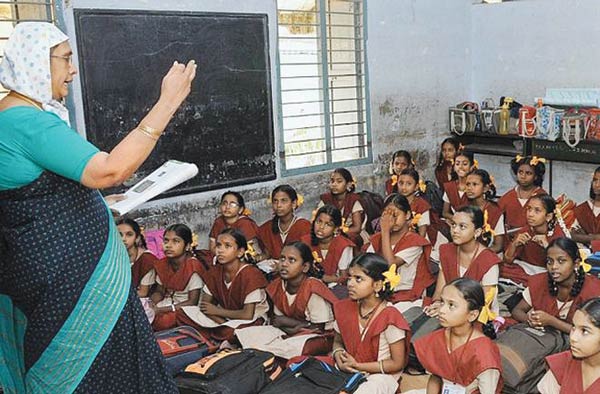Tamil Nadu-Half-hearted initiative

Linguistically proud dravidian governments which have ruled the south-eastern seaboard state of Tamil Nadu (pop. 72 million) since the mid-1960s, after the disastrous attempt of the then almighty Congress party to impose “Hindi imperialism” on the southern states proved a dismal failure, have continued since then to insist on Tamil being the compulsory first language, i.e, medium of instruction, in the state’s 45,614 government and aided schools and 10,934 private unaided matriculation schools (unique to Tamil Nadu) affiliated with the Tamil Nadu State Board of Secondary Education (TNSBSE). However over the past few years, the state government has conceded the public demand for English medium, and separate ‘sections’ offering English as the first language have been introduced in government schools.
On November 12, the Madras high court passed interim orders on a PIL (public interest litigation) filed by M. Appavu, a former legislator of the opposition Dravida Munnetra Kazhagam (DMK) party. The court order directed the ruling All India Anna Dravida Munnetra Kazhagam (AIADMK) government to take a decision on introducing spoken English classes in all Tamil-medium government schools in the state. The court also impleaded the directorate of the State Council for Education Research and Training (SCERT), Chennai as respondents in the case.
This petition has greatly surprised the state’s judiciary, educationists and intelligentsia as Appavu is a prominent member of the DMK, a pioneer in advocating Tamil as the medium of instruction in all government schools. In 2006, the DMK government legislated the Tamil Nadu Tamil Learning Act (TNTLA), 2006 which made Tamil a compulsory first or second language in all TNSBSE-affiliated government and private schools. Schools were asked to introduce Tamil mandatorily for all class I students in 2006 and scale it up to all class X children by 2015-16. Implementation of the TNTLA was reiterated by the AIADMK government led by chief minister Jayalalithaa before she passed away in December 2016.
However, despite the linguistic ardour of the DMK and AIADMK inspired by memories of their anti-Hindi agitations of the 1960s, and reignited time and again by the propagation of Hindi and Sanskrit by the BJP-led NDA government voted to power in Delhi in May 2014, there is emerging statewide acknowledgement that English language learning is imperative in the contemporary globalised world.
Moreover, since rising aspiration for English-medium education is precipitating a continuous flight from government schools, the late Jayalalithaa-led AIADMK government introduced English-medium ‘sections’ in a few selected state government and Chennai municipal corporation schools in 2012-2013. This initiative proved to be popular. In 2017-18, 622,006 children were enrolled in English-medium sections of 12,738 government schools. On July 20 this year, the state government announced its intent to introduce optional English-medium sections in all government-aided schools.
However, educationists in the state are sceptical about the success of this belated initiative. According to them, English is merely being taught as a subject rather than a language of communication.
“Proficiency in English language is possible only if students develop listening, reading, writing and speaking skills. In our classrooms, students are given opportunity to read and write in English but very few opportunities to speak or listen in the language. Moreover, instead of recruiting teachers fluent in English, teachers who have been teaching in Tamil have been hastily trained and transferred from Tamil-medium to English-medium sections within the same school. Inevitably, they lack proper pronunciation, diction and fluency in English. Children should be taught all other subjects in the mother tongue but English should be taught intensively using audio-visual aids like CDs and DVDs to enhance vocabulary and improve pronunciation and by encouraging students to converse in English,” says Dr. M.P. Vijayakumar, a former state project director of SSA, who conceived and implemented the highly successful Activity Based Learning programme for primary schools in Tamil Nadu.
With numerous surveys and reports testifying that the great majority of 600,000 engineers who graduate countrywide every year are unemployable, Appavu’s petition demanding spoken English classes in TNSBSE schools is of great import. According to a 2015 study conducted by Delhi-based Aspiring Minds, a skills assessment company which surveyed 30,000 graduates of 500 engineering colleges across the country, 97 percent of them lack the English speaking skills required for high end jobs and 52 percent lack spoken English skills required for any job in the knowledge economy.
In the circumstances, this patchwork attempt of the state government to belatedly bring the state’s short-changed students in government schools on a par with English-fluent private school children by miraculously transforming over 148,174 government teachers who have been teaching in Tamil for decades into English-medium teachers, is unlikely to succeed. For the incumbent or succeeding governments of Tamil Nadu (which goes to the polls in 2021), there’s no option but to increase the budgetary allocation for education and mass-recruit a new crop of English teachers with fluent writing and speaking skills.
Hemalatha Raghupathi (Chennai)














Add comment